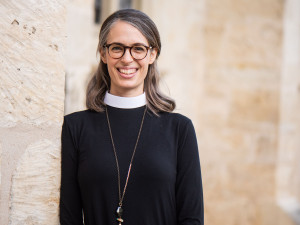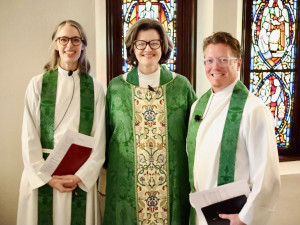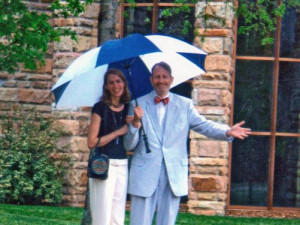"As a seminarian, I was prepared for stewarding the Episcopal faith in a way that still feels relevant, even as the way the church is expressed in the world is changing."

(Photo credit Wendi Poole)
The Rev. Ann Benton Fraser, T’07, was only 23 when she entered the School of Theology—but she arrived with 13 years of experience in seeking and serving God on an expansive domain. A Louisiana native, Fraser spent nearly all of her childhood summers on the 160-acre campus of Camp Hardtner, the state’s only Episcopal youth camp. (Notably, Bishop Girault Jones, T’28, former bishop of the Diocese of Louisiana, played a leading role in establishing the camp more than 75 years ago.) Fraser says that being a camper and counselor, and regularly attending church in her small hometown of St. Francisville, “gave me a wonderful way to understand and process my faith, as well as a community in which to discern a call to ministry.”
Camp was also where Fraser met her husband, Andrew, whom she married seven months before starting at the seminary. On the Mountain, the Frasers lived in the Woodlands area, close to the Rev. Matt Wise, T’08, who now serves with Ann at St. Mark’s Episcopal Church in San Antonio.
Fraser toured other seminaries before enrolling at Sewanee, but, she says, she was particularly enthused by the warm reception she received from the School of Theology’s admission team. “Roslyn Weaver worked in School of Theology admissions at the time,” Fraser recalls, “and every time I called, she would say, ‘Hello, how are you? And how’s Andrew?’ There was this sense of being known and that Sewanee had an interest in my being part of the community—and I know I’m not the only one with a story like that.”
The financial assistance available through the School of Theology was also a major draw, Fraser says. “I was right out of college and had no assets to speak of. I was grateful that Sewanee gave me such hospitable care and real clarity about what financial support would be like.”
The relationships that Fraser built during her admission process continued and grew once she reached the Mountain. “I had a lot of great support from the faculty," she says, "and I felt cared for and invested in.” She says she also appreciated how every element of her seminary experience felt “interwoven” and germane. “As a seminarian, I was prepared for stewarding the Episcopal faith in a way that still feels relevant, even as the way the church is expressed in the world is changing.”
Sewanee’s 13,000 acres were a welcome throwback to Camp Hardtner. “Having beautiful spaces in which to ponder and reflect and spend time was something I cherished,” Fraser notes. As she worked to discern her call, she says, she initially felt drawn to school chaplaincy or a similar youth ministry role. Through her coursework, field education placement, and Clinical Pastoral Education (CPE) experiences, though, she gradually felt pulled toward parish ministry. “When I started at the seminary, I had very little experience as an adult in a parish, so I didn’t fully understand what parish ministry could be like,” she says. “I really found and fell in love with that type of service at Sewanee.”

Knowlton, and the Rev. Matt Wise, T'08 at
St. Mark's Episcopal Church in San Antonio, TX
(Photo credit Zach Leal)
After earning an M.Div., Fraser received a fellowship from Lilly Endowment Inc. to participate in its Transition into Ministry initiative, a two-year program designed to help newly ordained seminary graduates navigate the leap between academic study and parish leadership. With their bishop’s blessing, the Frasers moved from the Mountain to Manhattan, where Ann became a fellow at St. James’ Church on the Upper East Side. As part of the Lilly Fellowship, she served under St. James’ now-retired rector, the Rev. Brenda Husson, engaging in rotations similar to a medical student’s on-the-job training. “We rotated through areas of ministry like pastoral care, youth ministry, and outreach, while taking a share in preaching, liturgical leadership, and weddings and funerals. We also had regular meetings with the rector and the vicar,” Fraser says. “It was a lot of intentional learning and support, in preparation for a very vibrant parish ministry.”
Post-fellowship, the Frasers went straight back to small-town living—Ann was called as the first rector of St. Paul’s Episcopal Church in Corinth, Mississippi, where she served for almost 10 years before accepting a call to her current role as associate rector for outreach, pastoral care, and parish life at St. Mark’s. She and Andrew have three school-age children.
Fraser characterizes St. Mark’s as reflecting some aspects of San Antonio, which is often described as a big city that feels like a small town: “There are people in our congregation with generations-long connections to the parish, but San Antonio is also a military town, so we have a lot of people coming in and out of the community as well.” Community service is one of the parish’s core values, and, Fraser says, “It’s easy to name several wonderful service organizations that have roots in the ministry at St. Mark’s, and that desire to engage in meaningful community action still holds true today.”
Another key parish value, Fraser notes, is continuing formation. “Christians need to be fed and formed in our daily lives, and the Church needs to be invested in forming leaders who can guide it into the avenues God is calling us to,” she says. In keeping with this view, St. Mark’s provides a monthly gift to the School of Theology’s 1% for Theological Education Fund, which helps cover a range of seminarian expenses, such as need-based and merit scholarships, spiritual direction, and support with housing and insurance.
Fraser also strengthens the seminary through personal gifts. “There are so many ways that my formative experiences at Sewanee have shaped my approach to ministry,” she says. “I really have a sense of gratitude for what I’ve been given—and a sense of hopefulness about what’s next for the University.”
The Rev. Casey Perkins, T’22, director of annual giving for the School of Theology, echoes Fraser’s observation that strong seminaries form a robust Church. “School of Theology graduates serve the Episcopal Church in all sorts of ways, but a majority of our alumni are parish priests,” he says. “Especially given the current high rate of retirement among Episcopal priests, we feel that Sewanee is critically important to the Church’s growth—but we need parish and diocesan contributions in order to form skilled Church leaders. So, it's a reciprocal relationship.”

former Sewanee Trustee Jimmy Benton
As a member of the School of Theology’s Alumni Council, Fraser returns to the Mountain with some regularity, and she says she feels “proud and encouraged” to see the University’s continual progress. In particular, she shares, she’s excited by the revitalization of Hamilton Hall. She also appreciates the University’s racial reconciliation efforts. “It’s encouraging to see Sewanee working to understand its history and story,” she says. “All stories are better when we tell the whole of them—not that they’re easier.” As she follows developments on campus, Fraser says, “I pray for Sewanee in great hope and expectation.”

